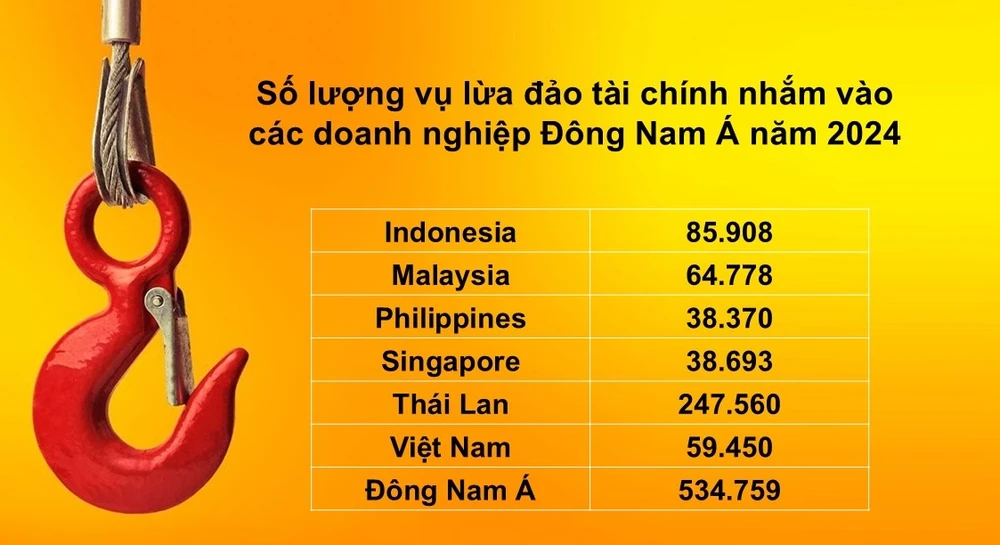
Financial Phishing is a form of attack that directly targets banks, payment systems, and online retailers. Attackers design fake websites with interfaces that simulate reputable payment platforms, with the aim of tricking users into revealing financial information.
“Based on the number of attacks on enterprise devices detected by Kaspersky solutions, we see that the cybersecurity situation in Southeast Asia is alarming. With the digital economy expected to reach $1 trillion by 2030, the region will become a “hot spot” for cybercriminals to take full advantage of the digital transformation and carry out illegal activities,” said Yeo Siang Tiong, General Manager for Southeast Asia at Kaspersky.
From January to December 2024, Kaspersky detected and prevented a total of 534,759 financial fraud attempts against businesses in Southeast Asia. These attacks, which targeted small businesses to large corporations, were carried out mainly via emails, fake websites, messaging apps, social networks, and more.

Thailand recorded the highest number of financial fraud attacks targeting businesses in the region with 247,560, followed by Indonesia with 85,908 and Malaysia with 64,779. Businesses in Vietnam also faced 59,450 attacks, while Singapore and the Philippines recorded fewer cases, with nearly 38,000 cases.
“The rapid advancement of artificial intelligence (AI) is being exploited by cybercriminals to create more sophisticated fake websites than ever before. With a large number of fake websites, the risk of users falling victim to fraud is higher than ever, while the use of AI to identify and prevent scams is still limited,” Mr. Yeo added.
To minimize the risk of falling victim to scams, Kaspersky experts recommend:
For individual users: Only open emails and click on links from trusted senders; If you receive an email from a valid address but the content appears suspicious, contact the sender via another method of communication to verify; Double-check the spelling of the website URL if you suspect it is a scam. Scammers often use confusing characters, such as substituting the number "1" for the letter "I" or the number "0" for the letter "O"... Use reputable security solutions when accessing the internet.

For businesses: Organize regular cybersecurity training courses for employees, so they can recognize and detect early techniques and tricks of cybercriminals. Set up the first layer of protection right at the business email gateway. This helps prevent malicious links and attachments, even if employees still receive spam. Deploy strong and flexible security solutions, integrating anti-phishing technology on all work devices to ensure maximum safety...
Source: https://www.sggp.org.vn/hon-500000-vu-tan-cong-lua-dao-nham-vao-cac-doanh-nghiep-tai-dong-nam-a-post788151.html


![[Photo] Close-up of Vietnam's sniffer dog team searching for earthquake victims in Myanmar](https://vstatic.vietnam.vn/vietnam/resource/IMAGE/2025/4/1/d4949a0510ba40af93a15359b5450df2)
![[Photo] President Luong Cuong and King Philippe of Belgium visit Thang Long Imperial Citadel](https://vstatic.vietnam.vn/vietnam/resource/IMAGE/2025/4/1/cb080a6652f84a1291edc3d2ee50f631)

![[Photo] General Secretary To Lam receives King Philippe of Belgium](https://vstatic.vietnam.vn/vietnam/resource/IMAGE/2025/4/1/e5963137a0c9428dabb93bdb34b86d7c)

![[Photo] Prime Minister Pham Minh Chinh meets with King Philippe of Belgium](https://vstatic.vietnam.vn/vietnam/resource/IMAGE/2025/4/1/be2f9ad3b17843b9b8f8dee6f2d227e7)



















































































Comment (0)